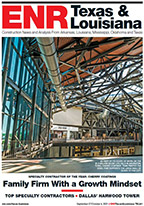New Tower Crane Assessment Exams Raise Operator Certification Debate 10/4/2004
Proponents of a new standardized test for tower crane operators hope to advance industry safety and accountability in the midst of a controversial, national push for certification in the U.S.
The National Commission for the Certification of Crane Operators unveiled its test Sept. 25 at its rigging conference in Chicago hosted by Specialized Carriers and Rigging Association, Fairfax, Va. The test follows an older mobile crane program and includes a 50-ques- tion written exam. A second, hands-on exam lasts an hour.
 |
| Climbing. Kinser says tests increase public safety. (Photo by Tudor Hampton for ENR) |
Fairfax, Va.-based CCO spent a year and $50,000 to create the exams. Operators will pay between $100 and $225 to take them, depending on their existing certification status. Free course materials are available online at www.nccco.org.
"It is incumbent upon owners to make sure that when operators get into a crane, they can operate it," says Phillip R. Kinser, CCOs manager of program development. "The test should determine whether the operator is qualified or not." The crane exam "is an excellent program," says Bill Smith, safety director of Maxim Crane Works, Pittsburgh.
Some say the test is unfair. Operators can qualify on a self-erecting crane, where they sit near the ground and look up, or a hammerhead crane, where they sit high and look down. Robert Hileman, president of Baltimore-based United Crane and Rigging Co., asks, "are we passing them on the self-erector because we cant find enough hammerhead cranes to do the tests?"
|
Kinser agrees that crane availability is a problem, but claims the basic job function is the same. There are about 1,000 tower cranes in the U.S., but many more mobile cranes, he says.
CCO, a nonprofit organization, says it has received strong industry support despite some employers who question the need for exams to be independently audited (ENR 8/2 p. 18). The U.S. Occupational Health and Safety Administration is studying the economic impact of certification. If OSHA decides to mandate it in a new crane and derrick rule, regulators say they may leave the door open for various testing.
Some states are moving ahead on their own. California has mandated that all 20,000 mobile and tower crane operators in the state be certified by an independent testing organization by June 2005 and has approved CCOs programs. "Its a little overwhelming," says Larry McCune, Cal/OSHA principal safety engineer. The state currently has only 30 volunteers to administer thousands of hours of practical exams. Several other organizations now are applying for accreditation, McCune says.


